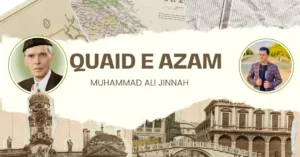Muhammad Ali Jinnah:
Muhammad Ali Jinnah (considered Mahomed Ali Jinnah Bhai; 25 December 1876 – 11 September 1948) was a guide, lawmaker and the coordinator behind Pakistan. Jinnah filled in as the top of the All-India Muslim Relationship from 1913 until the start of Pakistan on 14 August 1947, and a short time later as the Space of Pakistan’s most significant lead delegate general until his end.
Family Three:
Father Name “Jinnah bhai Ponnja”
Mother Name “Mitibai Jinnah”
(Only two Brothers “Ahmed Ali Jinnah, Band Ali Jinnah)’’ (And four Sister “Maryam bai Jinnah, Rahmat bai Jinnah, Shireen bai Jinnah, Fatima Jinnah)”
Early Life (Birth and schooling):
. On 25 Dec, 1876, Mitibai give birth to a son named Muhammed Ali Jinnah.
. His father Jinnah bhai Poonja enrolled him in a school when he was six (Sindh Madrasatul Islam)
. Jinnah joined Gokal Das Tej Primary school in Bombay. He remained in Bombay for only six months, returned to Karachi and joined to Sindh madrasa.
. He then joined the Christian mission high school in Karachi.
. In 1892, Sir Frederick Leigh Croft, a business associate of Jinnah father, offered young Jinnah a London apprentices with his firm, Graham’s shipping and trading Company.
First Wedding:
Before he went to England, his mother arranges his marriage with fourteen years old girls’ names Emibai Jinnah was hardly sixteen. The ceremony took place in February.
Journey To London:
Jinnah was trained as a barrister at Lincoln’s Inn in London, (1893). After joining Lincoln’s Inn, he developed further interest in politics. Rattan bai died (20Feb 1929, Age 29, Bombay)
Second Marriage:
Aged about 40, he took Rattan bai petit as his second wife on April 19, 1918. She had converted to Islam. After accepting Islam, she was named Maryam Jinnah, then she had a daughter named Dina Jinnah.
Jinnah in Politics:
Upon his return to India, he enrolled at the Bombay high court, and took an interest in national politics. Jinnah rose to prominence in the Indian national congress in the first two decades of 20th century.
In his early years of his political career, he advocated Hindu-Muslim-Unity. In 1920 Jinnah resigned from the congress.
With the start of 1940, Jinnah had come to believe that Muslims of Sub-Continent should have their own state. In those years, the Muslim league, led by Jinnah passed the Lahore resolution. Finally Sub-continent divided. As Become 1st governor general of Pakistan (15 August 1947) Jinnah worked to establish the new nation government and politics.
Quaid-E-Azam Join Muslim League:
In December 1912, Jinnah addressed the annual meeting of the Muslim league although he was not yet a member. He joins the following years, although he remained a member of the congress as well and stressed that league membership took second priority to the “greater nation cause” of an independent India.
Jinnah Proposed Two Nation Theory:
In Muhammad Ali Jinnah’s All India Muslim league presidential address delivered in Lahore on march 22, 1940, he explained. It why our Hindu friends fail to understand the real nature of Islam and Hinduism.
Quaid-E-Azam About Kashmir:
My message and earnest appeal to Muslim leadership in Kashmir is “Organize your people educationally, socially, economically, and politically and set your hand on constructive nation building program.
Quaid-E-Azam Message for Youngster:
My young friends, I look forward to you as the real maker of Pakistan, do not be exploited and do not be missed. Create amongst yourselves complete unity and solidarity, set an example of what you can do.
Muhammad Ali Jinnah Declare in 1940:
By 1940, Jinnah had come to believe that the Muslim of Sub-Continent should have their own state the avoid the possible marginalized status they may gain is an independent Hindu-Muslim state. In those years, the Muslim League, led by Jinnah, passed the Lahore the resolution, demanding a separate nation for Indian Muslim.
Message of Quaid-E-Azam 11th August 1947:
Addressed, constitutional Assembly of Pakistan on election as its president, Karachi, 11August 1947’ (You are free// You are free to go to your temples// You are free to go to your mosques or to any other places of worship in this state of Pakistan.
Quaid-E-Azam Last Word:
The doctor gave him an injection of force and according to Dr Elahi Bakhsh, when he regained consciousness and told Jinnah that he would recover soon be said “softly No… I will not live. According to Dr Elahi Bakhsh, these were the last words of Quaid-E-Azam Muhammad Ali Jinnah.
Dynamic Leader:
“(I do not believe in talking the right decision, I take a decision and makes its rights)”
“(Expect the best prepare for the worst)” “(Failure is a word unknown to me)”
Book Name:
(Jinnah of Pakistan) “Written by (Stanley Wolpert) “Jinnah remains Pakistan’s greatest leader. (Stanley Wolpert)
Conversation:
Few individuals significantly alter the court of history, fewer still modify the maps of the world. Hardly anyone can be credited with creation a nation state. “(Muhammad Ali Jinnah did all three)”
Written By
This Article is written by Farhan Akram A student of journalism, Abdul Wali Khan University Mardan.
Email: [email protected]
